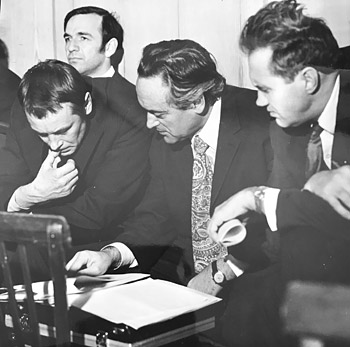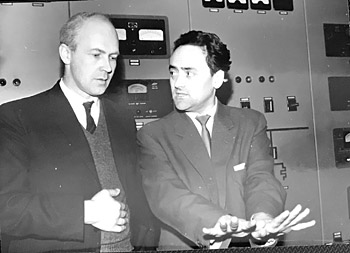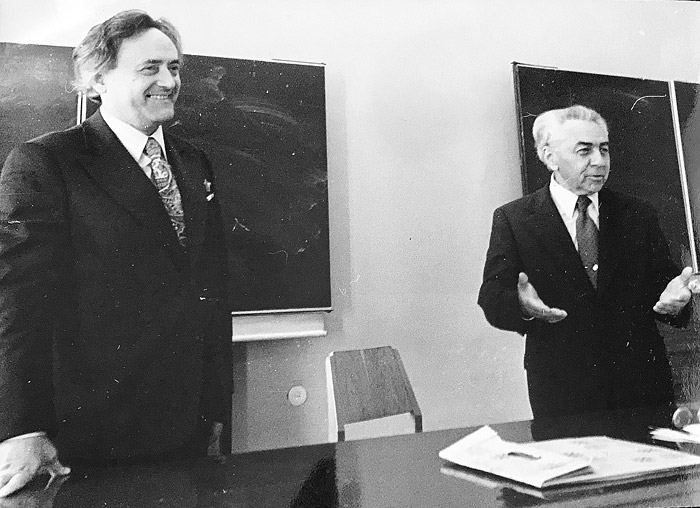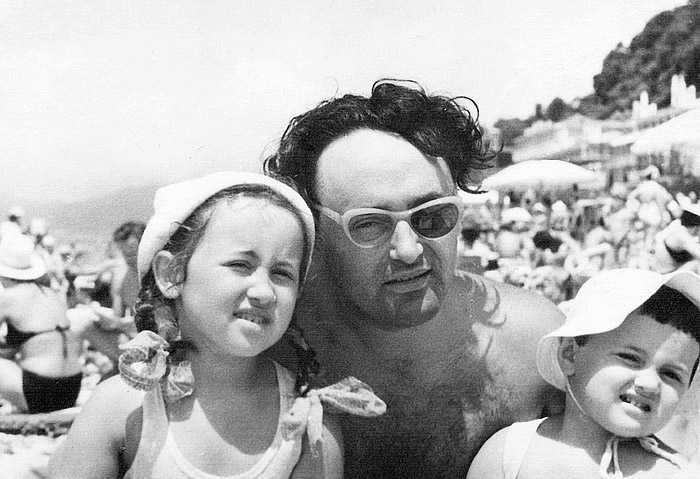
Electronic english version since 2022 |
The newspaper was founded in November 1957
| |
|
Number 23 (4620) |
To the 95th anniversary of Lev Iosifovich Lapidus
"He was a truly intelligent man"
Lev Iosifovich Lapidus was born on 22 June, 1927 in Moscow in the family of the famous Soviet economist Iosif Abramovich Lapidus and the tuberculotherapist Grunya Kasrilievna Shemtova. Iosif Abramovich was from Minsk and Grunya Kasrilievna came to Moscow after the Jewish pogroms from Druya, Polotsk region. The young people met in Moscow as medical students at the First Moscow University. In 1924, I.A.Lapidus graduated from the Faculty of Medicine and in 1929 - from the Faculty of Philosophy.
Before the war, Iosif Abramovich was a professor of philosophy. In the first days of the war, he went to the front in the people's militia as a medical volunteer and after a short time he died in the battles near Rzhev. Only in 1972, thanks to the great efforts of his sons, it was possible to find the place of his burial.
Grunya Kasrilievna during the war years worked in the Main Military Sanitary Directorate of the Red Army and in the post-war years she devoted herself to working as a pediatrician.
After returning from the evacuation, Lev Iosifovich externally graduated from the tenth grade of school No.110 in Moscow and entered D.Mendeleev University of Chemical Technology of Russia. After a year and a half of study, he transferred to the newly established Moscow Mechanical Institute (later MEPhI) and graduated from it in 1950, becoming one of its first graduates. When he studied at Mendeleev University, he met Sophia Lvovna Smirnova, who in 1948 became his life partner and lived with him in all joys and sorrows until the end of his days.
 |
| L.I.Lapidus with colleagues. |
 |
The results of my father's work always had a direct link to the experiment. That is why his opinion was considered authoritative and influenced the development of theoretical physics and, to no lesser extent, the development of experimental research at Dubna accelerators."
At the age of thirty-one, L.I.Lapidus became Deputy Director of the Dzhelepov Laboratory of Nuclear Problems and worked in this position from 1958 to 1980. He was engaged in the organisation of science and the development of young scientists, organised seminars, lectures and schools. He defended his doctoral dissertation in 1962 (at the age of thirty-five); three years later he received the title of professor.
Lectures and seminars of Lev Iosifovich were distinguished by the same clarity that was inherent in his scientific work. He was able to inspire listeners with the beauty of physical theories and convey to them his passion for science through the subject.
"Recalling the years of joint work, colleagues noted that communicating with dad was always interesting. He had a rare gift of listening carefully to the interlocutor, to delve into his problems. This talent also distinguished him at the post of Deputy Director of DLNP JINR. Gentleness and tact in communicating with people were combined with firmness and adherence to principles when he encountered manifestations of dishonesty in life and in science. He was a truly intelligent man!"
The work required full dedication of efforts. Lev Iosifovich went to work early and returned home late; at any moment he could be called to discuss scientific or administrative problems. He devoted himself to science and at the same time remained a loving father and a wonderful husband, about whom his daughters fondly remember: "Our parents loved us selflessly," says Irina Lvovna Lapidus. "Wonderful hours in the forest, on the bank of the Volga, at the sea, sledding and skiing, various sections, clubs, additional courses, just walks around the city, concerts, cinema, performances in the House of Scientists and Culture Centre, regular trips to Moscow to theaters and museums, tickets for which, sparing no effort, "got" our grandmother G.K.Shemtova and my father's Moscow friends. From a very young age, we were read a lot - until we learned on our own - our friends were welcomed and they were always very concerned about the possible diversity of our further education." Subsequently, both daughters of Lev Iosifovich graduated from MEPhI. Alla Lvovna became a professor of bioinformatics at the Center for Bioinformatics and Algorithmic Biotechnology at St.Petersburg State University, Irina Lvovna is engaged in radiobiology and its applied applications.

Lev Iosifovich found time and energy for numerous family friends as well. The husband and wife Lapiduses were cordial and hospitable hosts, the doors of their house were open to friends and colleagues, including those who came to Dubna from other cities. "As children, we sat on the laps of Ilya Mikhailovich Frank and Lev Davydovich Landau. A close person to our family was Yakov Abramovich Smorodinsky, whom we all loved very much," the sisters recall.
Sofya Lvovna was an excellent cook. For lunches and dinners prepared by her hands, such friends and neighbors gathered as the Bilenkys, the Prokoshkins, the Alfimenkovs, the Osetinskys, the Soroko, the Pikelners, the Pokrovskys, the Yutlandovs, the Polikanovs, the Perfeevs, the Zaimidoroga, the Zamolodchikovs and others. Close friends came from Moscow: Yu.M.Kagan (later Academician of the Russian Academy of Sciences, laureate of the Lenin and State Prizes of the USSR), L.M.Titov (a prominent designer of aircraft engines), L.B.Shagalov. "Frequent guests of the parents were V.P.Dzhelepov, Ts.Vylov, B.M.Pontecorvo and F.Legar. I wish I could mention everyone, but that's just impossible!" the daughter Irina adds.
Not only eminent scientists from all over the world, but also young colleagues of Lev Iosifovich visited the Lapidus house: B.Z.Kopeliovich (now professor and member of the Board of Directors of the UTFSM University in Valparaiso, Chile), G.I.Lykasov, A.V.Tarasov, A.B.Zamolodchikov, S.Namsaray and Ch.Tseren (both of them subsequently were presidents of the Mongolian Academy of Sciences at different times) and others.
Lev Iosifovich Lapidus did a lot in life. In addition to work, scientific interests, family and friends, he also found time for his hobbies: collecting stamps, photographing, reading. From frequent international business trips, in addition to stories about distant countries, he took with him photographs, slides, amateur films. He collected a large library of fiction and art books at home. "A good vacation for dad was skiing, playing tennis, long-distance swims on the Volga and in the sea, family picnics in nature with a game of badminton and hiking for mushrooms and berries, long walks talking about everything with his closest friends."

L.I.Lapidus tried to create a cultural space not only in his own home, but also in his native town: in 1958 he participated in the establishment of the JINR House of Scientists, was a member of its first Council, of which B.M.Pontecorvo was elected Chairman, was friends with the first Director of the House of Scientists O.Z.Grachev and supported him in every possible way.
"We are grateful to everyone who, even 36 years after the death of our dad, keeps a good memory of him as a scientist and a person, and we will be grateful to everyone who wants to share their personal memories with us."
* * *
Boris Zinovievich Kopeliovich, Doctor of Physical and Mathematical Sciences, a student and colleague of Lev Iosifovich, sent us his memoirs about L.I.Lapidus.
B.Z.Kopeliovich is a theoretical physicist, MIPT graduate. He arrived in Dubna in 1969, and Professor Lev Iosifovich Lapidus, at that time Deputy Director of the Laboratory of Nuclear Problems of JINR, became his supervisor.
The range of scientific interests of Boris Zinovievich is the physics of elementary particles and their interaction with hadrons and nuclei. He headed the theoretical sector of the scientific and experimental department of the spark spectrometer immediately after the untimely death of L.I.Lapidus. Later, he worked at the Max Planck Institute in Heidelberg. He was the organiser of many scientific international conferences, meetings, seminars. Today B.Z.Kopeliovich is a professor at the University of Valparaiso in Chile.
"I did my diploma as an experimenter under the supervision of Alexey Fedorovich Pisarev. After that, he said that my talent for theoretical physics should not be buried in the ground and recommended me to graduate school with L.I.Lapidus. It is difficult for me to imagine a more intelligent and democratic person than Lev Iosifovich. It never happened that he recommended a topic for me to work on. I was always free to formulate the issue and solve it. Since then, I myself have had and still have many students but, unfortunately, I was not able to adopt this democratic attitude from Lev Iosifovich.
Together with L.I.Lapidus we worked on the physics of the spin. Perhaps the most famous was the work on the сoulomb-nuclear interference. Recently, the effects we predicted in 1973 have been most accurately measured at Brookhaven National Laboratory.
There were periods when we were engaged in the Regge theory. We have for the first time constructed a pomeron theory with a Regge intercept above one. Today it is an accepted choice.
In the 1980s, we were among the first to build models based on quantum chromodynamics (QCD). In 1981, together with Lev Iosifovich and A.B.Zamolodchikov, we predicted the color transparency effect and formulated the color dipole approach that became the most popular model in high-energy QCD.
Communicating with Lev Iosifovich, we often joked and I remember some of his statements and still use them. Sometimes the authors of articles in scientific journals try to prove their case by referring to numerous publications of other authors. To this I quote L.I.Lapidus: "Not every physical problem can be solved by voting."
We often traveled to numerous conferences and, of course, closely communicated with each other. There were many conferences within the USSR, but they did not let me go abroad. In 1984, Lev Iosifovich went to Heidelberg for the large PANIC (Particle-Nucleus Interaction Conference) conference that was organised (and abbreviated for it) by the then Director of the Max-Planck Institute Bogdan Poukh. Returning, Lev Iosifovich told how Heidelberg looked like, painted its ancient streets and the castle, the Neckar River, green lawns. To me it sounded like a story about the moon. Today, the Neckar River flows under my balcony and Bogdan Poukh has been my close friend and collaborator for 30 years up to now.
I often visited Lev Iosifovich as a guest. With his wife Sofya Lvovna, we maintained relations for a long time even after Lev Iosifovich left us.
Remembering L.I.Lapidus, I would like to emphasize his main quality - democracy in relation to others."
The material was prepared by the Scientific Communications Group of the Laboratory of Nuclear Problems, photo from the family archive of the Lapidus family and the Laboratory of Nuclear Problems.